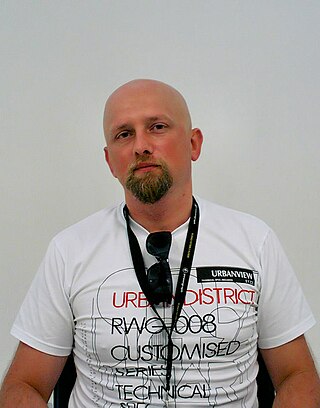
Boechout is a municipality of Belgium located in the Flemish province of Antwerp.

The Janusz A. Zajdel Award, often called just Zajdel, is the annual award given by the Polish science fiction and fantasy fandom for the best stories published in the previous year. The winners are chosen in a vote by fans present at the Polcon convention from up to five nominations in each of two categories:

Andrzej Ziemiański, also known as Patrick Shoughnessy, is a Polish author of fantasy, science fiction, thriller and crime, who by 2012 have sold over 500,000 copies of his books. Ziemiański was educated as an architect and he holds a PhD in architecture.

Hanka Ordonówna or Ordonka was a Polish singer, dancer and actress.

VEST (Very Efficient Substitution Transposition) ciphers are a set of families of general-purpose hardware-dedicated ciphers that support single pass authenticated encryption and can operate as collision-resistant hash functions designed by Sean O'Neil, Benjamin Gittins and Howard Landman. VEST cannot be implemented efficiently in software.

Science fiction and fantasy in Poland dates to the late 18th century. During the latter years of the People's Republic of Poland, a very popular genre of science fiction was social science fiction. Later, many other genres gained prominence.
Baklava is a world music acoustic band. Their key challenge is to create original music based on the aesthetic achievements of traditional Macedonian music. The band held several concerts in Europe and participated in several festivals, including the renowned Skopje Jazz Festival, Sfinks Festival in Belgium and other countries.

Peter Andreyevich Nalitch, also spelled as Petr Nalich or Pyotr Nalich, is a Russian singer and composer who represented Russia at the Eurovision Song Contest 2010 in Oslo. In the final on May 29, he came 11th with his song "Lost and Forgotten".

Freemasonry in Ukraine has appeared sometime in the mid 18th century when the first lodges were created on its territory at that time within the Polish–Lithuanian Commonwealth.
Sphinx Mountain is a linear mountain, 1,850 m, trending in a north-south direction for 6 nautical miles (11 km), standing 5 nautical miles (9 km) east of Nordwestliche Insel Mountains in the Wohlthat Mountains of Queen Maud Land. This mountain was discovered by the German Antarctic Expedition, 1938–39, who gave the name Sphinx to its northern peak. The name was extended to this mountain by Norwegian Antarctic Expedition, 1956–60, and the Soviet Antarctic Expedition, 1960–61, who referred to it as Sfinksen and Gora Sfinks, respectively. The recommended spelling has been chosen to agree with the original German form. Sphinxkopf Peak is at the northern end of Sphinx Mountain.

Twitch is an American video live streaming service that focuses on video game live streaming, including broadcasts of esports competitions, in addition to offering music broadcasts, creative content, and "in real life" streams. Twitch is operated by Twitch Interactive, a subsidiary of Amazon.com, Inc. It was introduced in June 2011 as a spin-off of the general-interest streaming platform Justin.tv. Content on the site can be viewed either live or via video on demand. The games shown on Twitch's current homepage are listed according to audience preference and include genres such as real-time strategy games (RTS), fighting games, racing games, and first-person shooters.

Robert M. Wegner is a Polish fantasy writer, winner of Janusz A. Zajdel Award in 2009 for his short story We All are Meekhanees and Sfinks Award in 2010 for short-story The Best You Can Buy.

The Spirit of Polonia, also known as Solidarity, by Edmund Lewandowski is a sculpture commissioned as part of the fifteenth anniversary of Polanki, the Polish Women's Cultural Club of Milwaukee. Sculpted in 1969, this piece is placed on the South side of the Milwaukee County Courthouse located at 901 North 9th Street in Milwaukee's downtown.

Aleksander Hertz (1879–1928) was a Polish film producer and director. Hertz was an influential figure in early Polish cinema, directing films such as the historical Countess Walewska in 1914. He founded the "Sfinks" film company. Hertz was of Jewish heritage.

Kounotori 6 (こうのとり6号機), also known as HTV-6, was the sixth flight of the H-II Transfer Vehicle, an uncrewed cargo spacecraft launched to resupply the International Space Station. It was launched at 13:26:47 UTC on 9 December 2016 aboard H-IIB launch vehicle from Tanegashima Space Center.
"Koniec świata o ósmej" is an early (1947) science fiction novelette by Polish writer Stanisław Lem. Professor Farragus claims that he discovered a "matter detonator" substance, which, when heated, starts a chain reaction causing the destruction of all matter. Irritated by a non-recognition of his fundamental discovery, and mockery, he decides to prove he is right by destroying the Universe.












